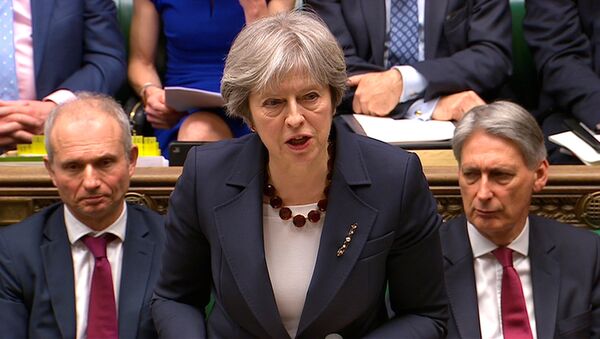After the poisoning of former GRU Colonel Sergei Skripal and his daughter, London immediately shifted to the language of ultimatum, RIA Novosti contributor Anton Lisitsyn writes, recalling that previously, an ultimatum was usually followed by a declaration of war.
"In 1914, Austria-Hungary issued an ultimatum to Serbia and it ended up in a world war; in 1939 Britain and France demanded that [Nazi] Germany cease hostilities and declared war, when the latter refused to do it," Alexei Kupriyanov, a researcher at the Institute of World Economy and International Relations of the Russian Academy of Sciences (IMEMO), highlighted in an interview with RIA Novosti.
The British police have released very limited information about the Skripal case. The former GRU officer was poisoned with a nerve agent. Scotland Yard Assistant Commissioner Mark Rowley said that UK law enforcers already know what kind of substance was used, but are not naming it in the interests of the investigation. However, British policy-makers immediately pointed the finger of blame at Russia.
WATCH: CCTV Footage of Skripal Right Before He Was Found Poisoned
One of the few UK politicians who called upon the government not to jump to conclusions was the leader of the opposition Labour Party Jeremy Corbyn. Corbyn raised the question as to why samples of the deadly substance have not been sent to Moscow in accordance with the provisions of the Organization for the Prohibition of Chemical Weapons (OPCW).
However, en masse British parliamentarians supported Prime Minister Theresa May, who said that "there [was] no alternative conclusion other than that the Russian state was culpable for the attempted murder of Mr. Skripal and his daughter."
"We have not witnessed such a fuss and heightened nervousness since the years of the Cold War," Viktor Mizin, a political analyst at the Moscow State Institute of International Relations (MGIMO), said. "It is also connected with internal political motives and May's own stance. Moreover, the UK prime minister has evaded the question whether she communicated with the Russian side about the poisoning of Skripal."
READ MORE: Moscow is Interested in Determining Truth in Skripal Case More Than London
Furthermore, the British rhetoric on the Skripal case very quickly transformed into direct insults toward Russia, Lisitsyn noted.
Speaking in Bristol on March 15, British Defense Minister Gavin Williamson claimed that "Russia should go away and should shut up," while commenting on Moscow's possible retaliatory measures to the expulsion of 23 Russian diplomats from the UK.
"What else can the Defense Minister of a country - which conceals the circumstances of the use of chemical agents on its territory and does not want to transfer available information, as required by the Convention on the Prohibition of Chemical Weapons - say? London has something to hide. Their partners are nervous," Russian Foreign Ministry spokesperson Maria Zakharova stated in response to Williamson's remark.
Meanwhile, on Thursday the UK finally agreed to provide the Organization for the Prohibition of Chemical Weapons with samples of the substance which was used in the poisoning of Skripal. British hesitance to follow the routine procedure raised a lot of questions in Moscow, Kupriyanov highlighted.
"If there is a suspicion of the use of a military grade nerve agent, countries send a request to the OPCW in accordance with certain procedures adopted by this organization. There are legal regulations, so Moscow is puzzled why London did not use them earlier," the academic noted.
On the other hand, it is similarly puzzling why London demanded that 23 Russian diplomats should be expelled without presenting any credible evidence to justify this move, Kupriyanov noted, warning London against unleashing a diplomatic war on Russia.
"In this very case, there is no evidence that our diplomats are intelligence agents [to justify their expulsion]," the academic underscored. "It's dangerous to start a diplomatic war. The last mass expulsion [of Russian diplomats] occurred in 1985, after the defection of Soviet intelligence officer Oleg Gordievsky: 25 people were expelled from London. Our response was much more efficient: Virtually all British diplomats who knew the Russian language were booted from Moscow. As a result, when large-scale changes began in the USSR, the British embassy found itself in a difficult situation."
Meanwhile, Theresa May announced that London suspends all planned bilateral high-level contacts between Britain and Russia. Furthermore, the UK leadership rushed to withdraw the invitation to Foreign Minister Lavrov to visit Britain. The irony of the situation is that the invitation has not been even accepted by the Russian foreign minister, Lisitsyn remarked.
The journalist called attention to yet another example of the UK's "undiplomatic behavior": London refuses to provide further explanation on the Skripal case, giving only non-committal replies to Moscow.
On March 4, Sergei Skripal, who was accused of espionage on behalf of London and later granted asylum in Britain as a result of a US-Russia spy exchange, and his daughter were found unconscious in a Salisbury shopping center.
READ MORE: Russia Opens Criminal Cases Over Yulia Skripal's Poisoning, Glushkov's Murder
London accused Russia of attempting to murder the former spy by using a military-grade nerve agent called Novichok, which was developed in the Soviet Union in the 1970s. Russia has rejected all allegations and requested access to the case materials, including samples of the substance, but was denied by London.
READ MORE: UK Intelligence: Novichok Was Planted in Luggage of Skripal's Daughter - Reports
The views and opinions expressed by Anton Lisitsyn are those of the speaker and do not necessarily reflect those of Sputnik.

